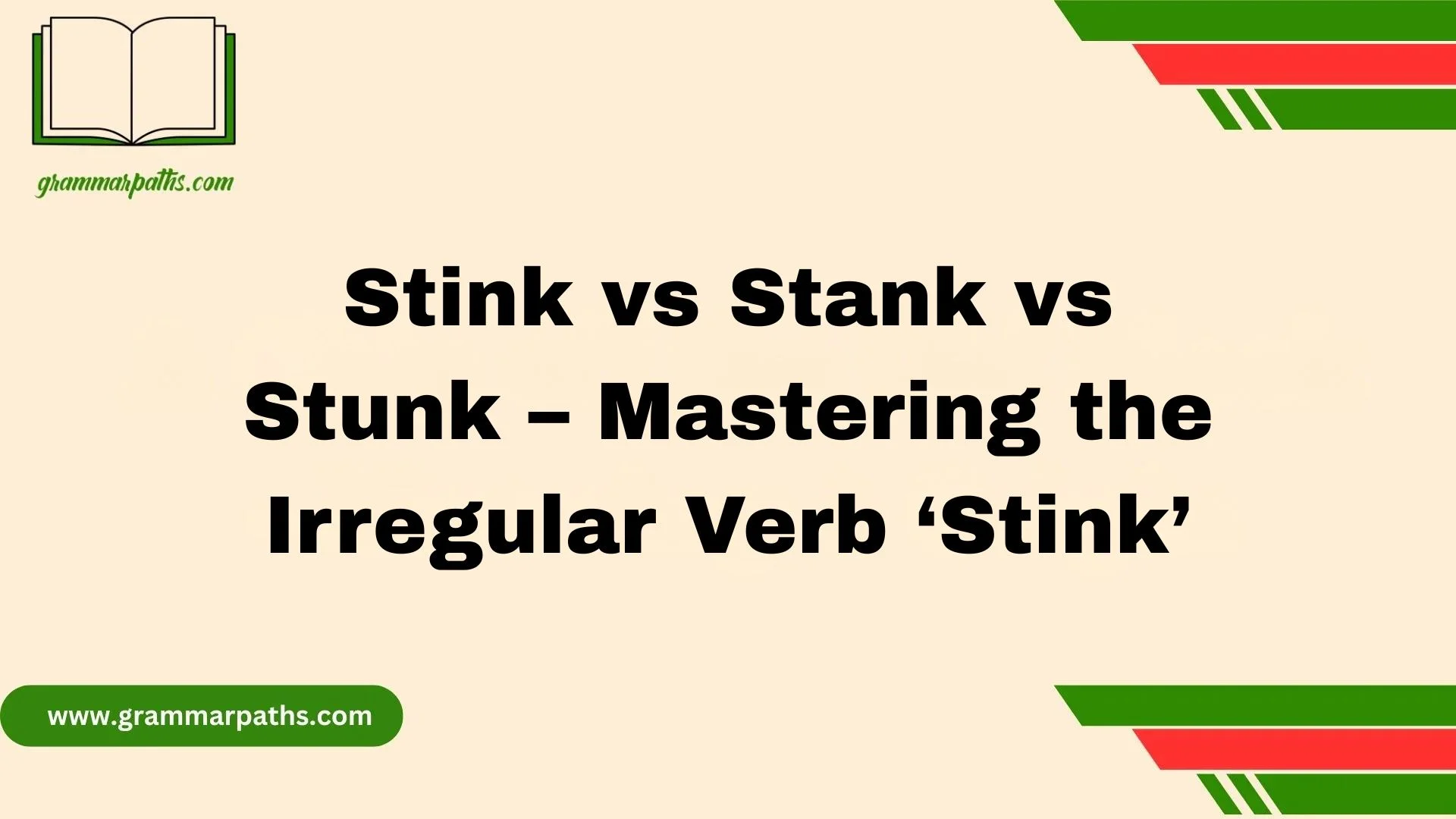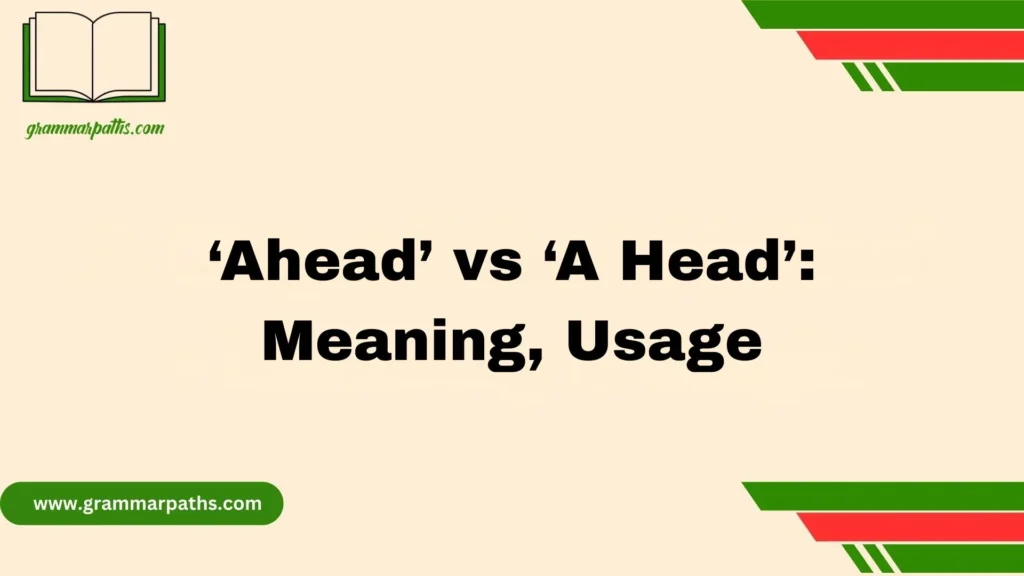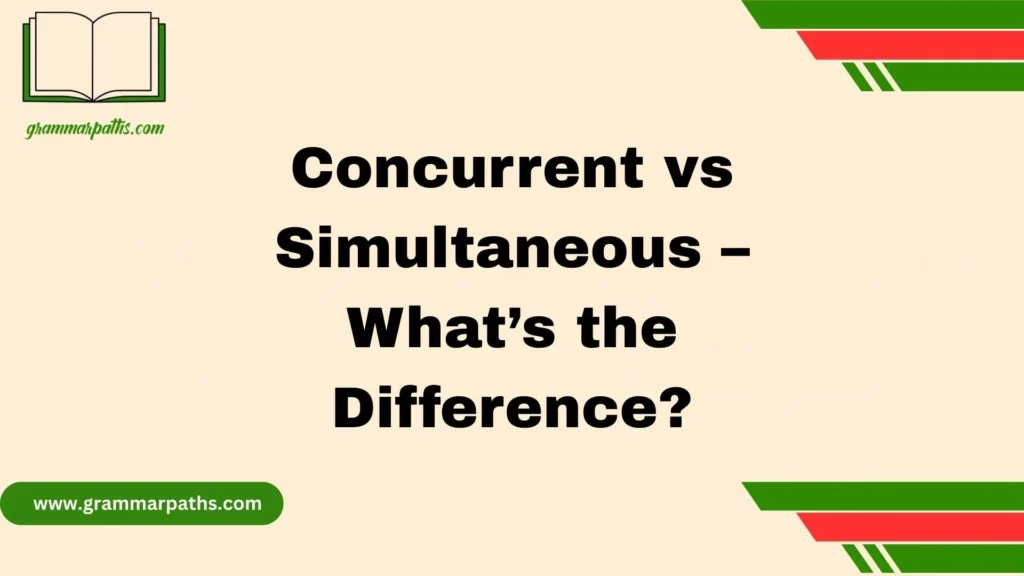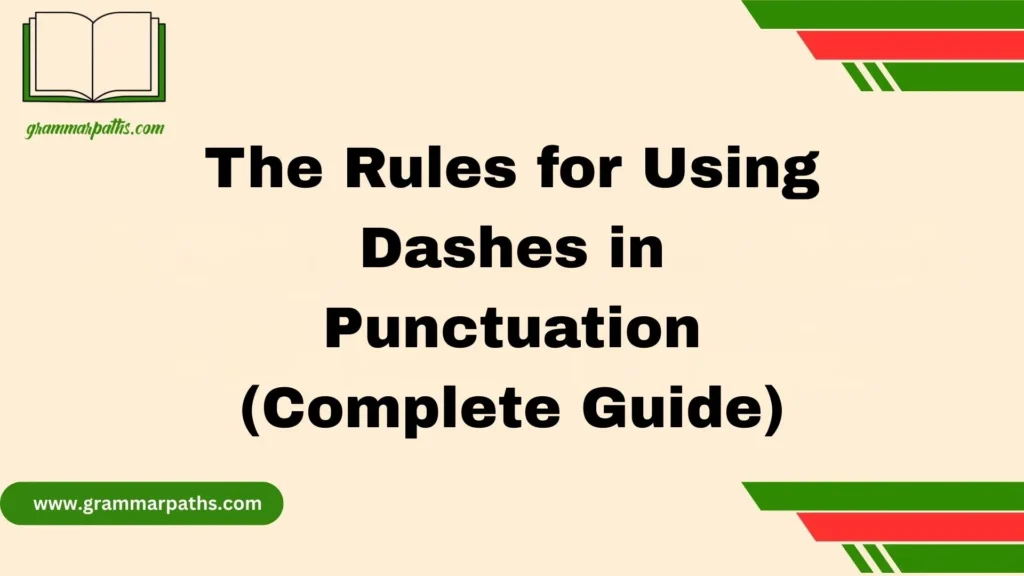Mastering Stink vs Stank vs Stunk – Mastering the Irregular Verb ‘Stink’ can seem tricky, but understanding these irregular verbs is essential for English learners who want their writing and speaking to feel smoother and more natural. The root verb is Stink, used in the present tense, like saying, “You stink after soccer.” For past situations, the past-tense form Stank applies, as in “He stank after gym class.” When describing something that has already happened and requires a polished, perfect tense, Stunk fits, for example, “They had stunk up the room.” Each form carries its own tone, function, and cultural flair, helping you convey messages with clarity and style.
In real-world examples, from pop culture, cartoons, and late-night sketches to casual writing and speech, learners often make embarrassing mistakes if they fail to compare and review the forms. Using mnemonic tricks like: “Today I stink, yesterday I stank, and I’ve always stunk,” can make this pattern easier to remember and more natural in everyday use. Understanding the origins, centuries of usage, and the oddball nature of these irregular verbs improves grammar, enhances tone, and makes writing fresher and more effective. Practicing these verbs consistently allows you to master both speaking and writing, avoiding embarrassing mistakes while making your English communication smoother, precise, and engaging.
Understanding Irregular Verbs in English
Irregular verbs don’t follow the standard “-ed” ending in past tense. They often change their vowel or sometimes alter entirely, as seen in sing → sang → sung. Understanding them is critical because they appear frequently in everyday speech and writing.
English irregular verbs are generally categorized into strong verbs and weak verbs. Strong verbs, like stink, change the vowel in their past forms rather than adding “-ed.” Weak verbs, on the other hand, follow predictable patterns (e.g., talk → talked). Knowing which category a verb belongs to helps you predict and memorize its forms.
Other common irregular verbs include:
| Verb | Present | Past | Past Participle |
| Sing | sing | sang | sung |
| Ring | ring | rang | rung |
| Drink | drink | drank | drunk |
| Swim | swim | swam | swum |
The Verb ‘Stink’: Meaning and Usage
At its core, stink refers to an unpleasant odor. For example:
- “The garbage stinks after three days in the sun.”
However, like many verbs, stink also carries figurative meaning. People use it to describe situations, decisions, or actions that are morally wrong, suspicious, or failed:
- “This plan stinks; I don’t think it will work.”
- “Something stinks in the company’s accounting.”
Understanding the literal and figurative meanings is essential. The correct form often depends on whether the verb expresses a current smell or state or a completed action.
Present Tense: Using ‘Stink’
The present tense stink is straightforward. It describes:
- Habitual actions: “The fridge always stinks if we leave food too long.”
- Temporary states: “That sock stinks because I wore it all day.”
In the third person singular, add -s:
- “He stinks after running.”
Common mistakes in present tense usually occur when speakers accidentally use past forms in ongoing actions:
- “The room stank because of the trash.” (Incorrect if referring to now)
- “The room stinks because of the trash.” (Correct)
Future Tense Usage
Future tense uses auxiliary verbs to express actions that will happen:
- “The garbage will stink if we don’t take it out.”
- “If you leave your shoes here, they’re going to stink by tomorrow.”
Note that stink doesn’t change form in future tense—the auxiliary verb does the work. Using will stink or going to stink is always correct.
Past Tense Forms: ‘Stank’ vs ‘Stunk’
English learners often confuse stank and stunk, but each serves a distinct purpose.
Stank: The Simple Past
Stank is the simple past form of stink. Use it for actions completed in the past:
- “Yesterday, the trash stank all day.”
- “His socks stank after the soccer game.”
It’s the more common past tense in everyday spoken English. Use stank when narrating a single completed action without auxiliary verbs.
Stunk: The Past Participle
Stunk is the past participle and pairs with auxiliary verbs like have, has, or had:
- “The garbage has stunk since last week.”
- “Her shoes had stunk before she washed them.”
Use stunk to indicate completed actions that affect the present or past situations, often in perfect tenses.
Comparing ‘Stank’ and ‘Stunk’
Here’s a quick table to clarify the differences:
| Form | Function | Example Sentence |
| Stink | Present tense | “The milk stinks if left out overnight.” |
| Stank | Simple past | “The milk stank yesterday morning.” |
| Stunk | Past participle with auxiliaries | “The milk has stunk since yesterday.” |
Memory tip: Think “stank” = simple past, “stunk” = has/had + stunk.
Figurative and Idiomatic Expressions
Stink isn’t just about smell—it appears in idioms and metaphors, making your English richer.
Common idioms:
- “Something stinks” → suspicious or wrong
- Example: “Something stinks about this contract.”
- “Stinks to high heaven” → extremely bad or offensive
- Example: “The corruption stinks to high heaven.”
In past contexts, you pair these with stank or stunk depending on tense:
- “The deal stank of fraud last year.”
- “The decision has stunk since it was made.”
Idiomatic usage often confuses learners, but observing context clues helps determine which form fits naturally.
Common Mistakes and How to Avoid Them
Mixing Past Tense and Past Participle
- “The milk stunk yesterday.” (Incorrect if using simple past casually; both can be acceptable but “stank” is preferred in narration)
- “The milk stank yesterday.”
Using Present Tense in Past Context
- “Yesterday, the trash stinks.”
- “Yesterday, the trash stank.”
Overgeneralizing Irregular Verbs
- Many learners apply -ed endings to all verbs:
- “The milk stinked yesterday.”
- “The milk stank yesterday.”
Tips for remembering:
- Link stank to single past actions
- Link stunk to perfect tense constructions
- Use examples and repetition in daily speech
Patterns in English Similar to ‘Stink, Stank, Stunk’
Several irregular verbs follow similar vowel change patterns. Recognizing them helps learners predict forms.
| Verb | Present | Past | Past Participle |
| Sing | sing | sang | sung |
| Ring | ring | rang | rung |
| Drink | drink | drank | drunk |
| Swim | swim | swam | swum |
| Begin | begin | began | begun |
Observing these patterns allows learners to spot trends and memorize efficiently, especially with strong verbs.
Practice Exercises
Fill-in-the-blank
- Yesterday, the trash ___ so bad that I couldn’t enter the kitchen.
- The cheese ___ in the fridge since Monday.
- If you leave your socks here, they ___ tomorrow.
Answers:
- stank
- has stunk
- will stink
Correcting Sentences
- “Her shoes stank yesterday, and now they has stunk.”
- Corrected: “Her shoes stank yesterday, and now they have stunk.”
Conclusion
Understanding Stink, Stank, and Stunk is key to mastering one of the most tricky irregular verbs in English. By knowing the root verb, its past-tense, and the perfect tense, learners can make their writing and speaking more polished, smooth, and natural. Using mnemonic tricks, reviewing real-world examples, and observing pop culture references can help solidify the pattern and avoid embarrassing mistakes. With consistent practice, you’ll gain confidence in applying these verbs correctly, while adding tone, function, and cultural flair to your communication.
FAQs
Q1: What is the root form of the verb?
A1: The root form is Stink, used in the present tense for current actions, like “You stink after soccer.”
Q2: When should I use Stank?
A2: Stank is the past-tense form, used for actions that already happened, e.g., “He stank after gym class.”
Q3: How is Stunk different from Stank?
A3: Stunk is the perfect tense, used when describing completed actions with a polished sense, as in “They had stunk up the room.”
Q4: Are there tricks to remember these forms?
A4: Yes, mnemonic tricks like: “Today I stink, yesterday I stank, and I’ve always stunk” help reinforce the pattern naturally.
Q5: Why is it important to learn these forms?
A5: Mastering these irregular verbs prevents embarrassing mistakes, improves grammar, and makes writing and speaking smoother and more effective.

Mia Rose is the passionate writer and founder of GrammarPaths.com, a resource dedicated to helping learners master English grammar, idioms, and writing skills with ease. With a deep love for language and years of experience in teaching and content creation, Mia simplifies complex grammar rules into clear, practical guides that readers can instantly apply.












